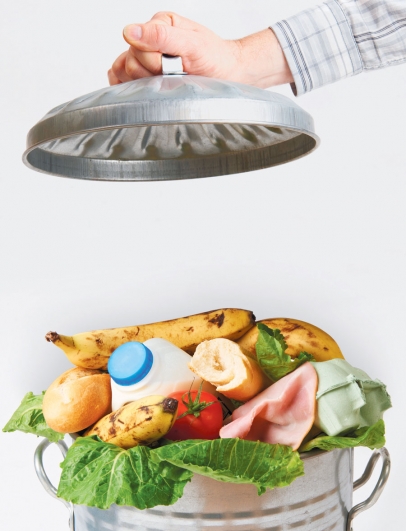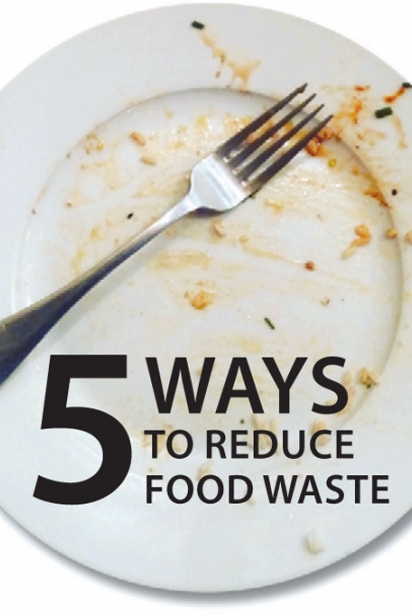Reducing Our Waste Line
1.8 million tons. Think about that number for a second. It’s pretty big, right?
That’s how much food waste was disposed of in Florida last year, according to the state’s Department of Environmental Protection (DEP).
In Manatee County, the total amount of food waste disposed of in 2015 was 57,855 tons, and in Sarasota county, it was 42,846 tons. In smaller Charlotte County, it was 12,640 tons.
The percentage of food waste that is recycled in Florida increased from 2.18% in 2010 to 4.49% in 2015, the DEP reports—still small percentages.
We in the United States throw away about one-third of our food, numerous sources report— and only about half of us are aware of the problems associated with food waste.
“Once in landfills, food breaks down to produce methane, a potent greenhouse gas which contributes to climate change,” the U.S. Environmental Protection Agency (EPA) reported on its site “Reducing Wasted Food at Home.”
Yet another downside of food waste is, well, waste, considering that 170,000 people in our area could not buy enough food and life necessities last year, according to statistics from All Faiths Food Bank.
A University of Florida survey of 500 Florida residents this year found that 60% agreed or strongly agreed that they are concerned about food waste in their household. Despite this general concern, “There’s not enough being done. Everyone can do more,” says John Matthews of the Suncoast Food Alliance.
Efforts to reduce food waste involve just about everyone related to food production and consumption, ranging from restaurants and grocers to food banks and businesses to consumers and the government. So just what’s being done in our area?
FARMS
Farmers are necessarily resourceful, so it only makes sense that folks like Jim Strickland of Manatee County’s Strickland Ranch would find a link in the food-waste-reduction chain. He receives several tons of spent hops and grains each week from Tampa’s Ulele Springs Brewery—part of Ulele Restaurant—to feed to his cattle. “It’s like rough-cut Scottish oatmeal. The cows absolutely love it,” he said. Strickland, whose meat is also available in some of Ulele’s dishes, worked with the University of Florida to first study the hops and grains and make sure there were no toxic issues.
Darwin Brewing of Bradenton has a similar arrangement with a local goat dairy, says general manager Matt Cornelius.
And Matthews, who raises chickens and produce, says he doesn’t have any waste. He has a compost pile that he can feed to the chickens, and any extra fresh food he grows goes to organizations like Meals on Wheels Plus.
Yet a challenge that farms face is food wasted before it ever reaches the markets, say local farm sources. For example, some food harvested is past its prime, or there’s produce that doesn’t look quite ready for prime time. Although some sources will take so-called “ugly” fruits or vegetables, much of it ends up going to waste.
RESTAURANTS AND LOCAL BUSINESSES
While not all restaurants and businesses are food-waste-conscious, the ones that are can serve as an inspiration for others.
Chef Adam Ruth of State Street Eating House in Sarasota takes pride in finding innovative ways to use every bit of food items. “I literally don’t throw anything away,” he says. So, beef scraps and leaves and stems from greens will end up in soups, stews, and other dishes. Ruth adds stems from Swiss chard in a mushroom purée. He says it gives the dish an earthy flavor that people won’t see, but they can taste the difference.
Some of Ruth’s food practices—such as using certain fish scraps—are more common in other parts of the world.
State Street also has made a conscious effort to serve smaller portions, since so much food usually ends up in the trash. “I’d say others typically serve twice the amount we do,” he says.
Over at the Ritz-Carlton in Sarasota, any food not served from the kitchen is donated to Our Daily Bread in Bradenton, says Marcie McGeehan, director of sales and marketing. “We have tried many different ways to up-cycle food waste over the years, from partnering with Big Cat Habitat to different food pantries,” she says.
Back at Darwin Brewing, their grains and hops aren’t the only food waste that’s reused. Some of the spent grains are used by the Manatee Technical College culinary lab to make multigrain crackers that are sold at the brewery. “Guests can see the full cycle of use,” Cornelius says.
The state’s DEP works with the Florida Green Lodging Program to recognize facilities that make a commitment to conserve Florida’s natural resources, such as by reducing food waste by composting or food bank donations, says Sarah Shellabarger of the DEP’s press office. This is one way that tourist-oriented businesses like hotels can play a role in food waste reduction efforts.
FOOD BANKS
Food banks are a natural recipient of excess food. All Faiths Food Bank collaborates with local grocers, farms, and other sources to help feed the needy. All Faiths has operated its Sprout Mobile Market truck for several years to bring produce to people in the area, says marketing director Beau Wilberding. Now, when Sprout goes out, a second truck accompanies it to offer staples that can go a long way during meal prep, such as potatoes, onions, and carrots. Those offerings wouldn’t be possible without local residents and businesses committed to reducing food waste.
And while there’s the long-held belief that food pantries are only interested in dried or canned food, All Faiths will take fresh items. In fact, that helps All Faiths’ commitment to offering healthy food. So, say you have a fruit tree and 20 pounds of extra oranges. The food bank will gladly take it, provided you can drop it off. Florida is a great place to have this abundance with the always-thriving agriculture business here, Wilberding says.
However, money donations help the food bank even more because it can stretch dollars better than the average consumer, he explains.
All Faiths also has received donations of so-called “ugly” produce. “It eats the same, and it’s incredibly valuable,” he says.
In fact, the desire to connect consumers and hobby gardeners with places where they can donate their excess led to the creation of the website AmpleHarvest.org, says founder Jerry Oppenheimer. A food pantry can register with the site to let local residents know it will accept fresh food donations. There are dozens of local food pantries listed on the site in the Bradenton/Sarasota area, yet Oppenheimer says that their site requires more awareness on the part of both gardeners and food pantries nationwide.
Our area also has the Suncoast Gleaning Project, which connects excess harvest from local farms with the food insecure. “Since 2010, we have donated nearly 200,000 pounds of organic fruits and vegetables,” the website Transitions Sarasota reports.
LOCAL GOVERNMENT, SCHOOLS, AND RESIDENTS
One big link in the chain of food waste reduction is local government involvement. Areas like San Francisco and Seattle have massive mandated efforts to encourage composting and reduce food waste. “There’s a ‘want to,’ but how do we get there?” says Randall Penn, a UF/IFIS solid waste reduction agent based in Sarasota. Businesses in our area like restaurants or grocers can make one-to-one arrangements for their food waste, but there is no centralized effort, at least not yet.
Penn teaches classes on composting once a quarter and senses an enthusiasm for the topic—although some worry about smell and attracting pests. (Compost piles typically don’t include meat, fish, or dairy, and compost bins that are kept away from homes and can be locked up can cut down on those nuisances, Penn explains.)
Vermicomposting—where worms help break down food waste—is how some places, like the Florida House Institute in Sarasota, help to combat the risk for odors and pests, says Florida House Institute’s Camille Van Sant. “The bonus is that the worms make the best sustainable fertilizer and bug repellant spray for the plants,” she says.
Some local schools in Sarasota County are taking baby steps in the quest to reuse food waste via composting. Still, there can be hesitation about the logistics, Penn says. “There’s always an ‘ick’ factor,” he says.
Reducing food waste becomes easier with a little practice, sources say. It can also help lower your food budget. Here are some suggestions from the U.S. EPA on reducing food waste:
1. Make meals with what you already have on hand.
2. Make a list of your weekly meals, and buy ingredients specific to those recipes. Buy only what you will use.
3. Get savvy about freezing, preserving, or canning surplus fruits and vegetables. Make the most of Florida’s abundant produce season in the winter and spring.
4. Use your food items in as many ways as possible, including soups, casseroles, stir-fries, sauces, baked goods, and smoothies.
5. Donate unneeded food to food banks.






